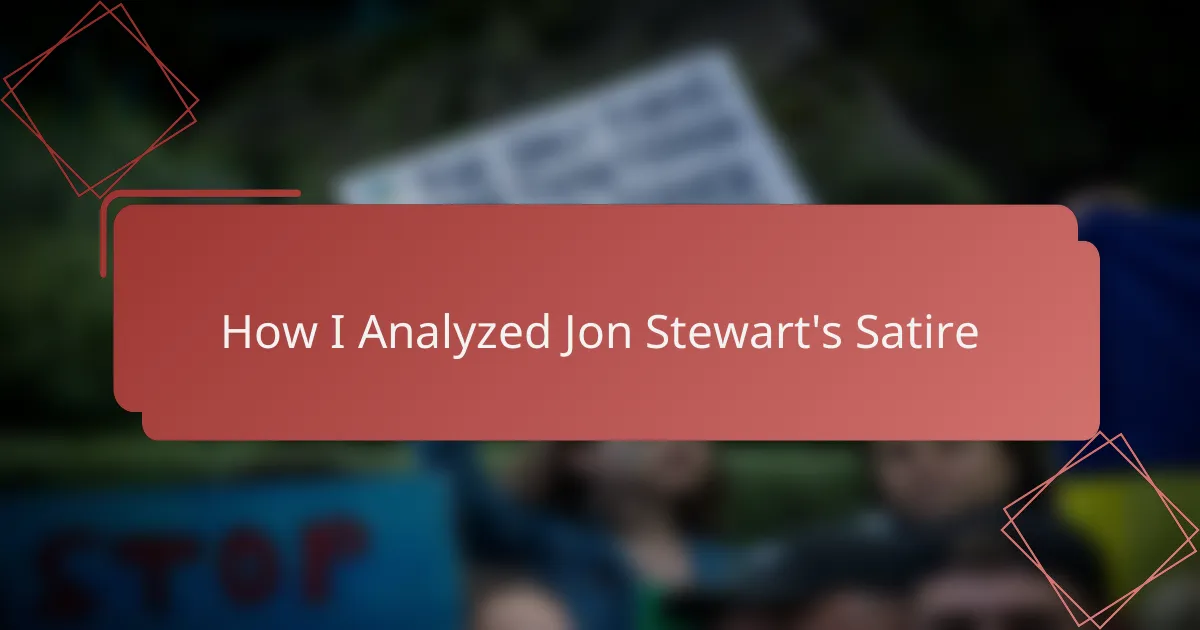Key takeaways
- Political satire, like John Oliver’s, blends humor with critique, making complex political issues accessible and engaging.
- Elements such as irony, exaggeration, and storytelling heighten the impact of satire while maintaining clarity and fairness.
- John Oliver’s style emphasizes in-depth research and emotional connection, turning abstract policies into relatable narratives.
- Satire serves as an educational tool, using humor to reveal truths and encourage critical thinking about political topics.
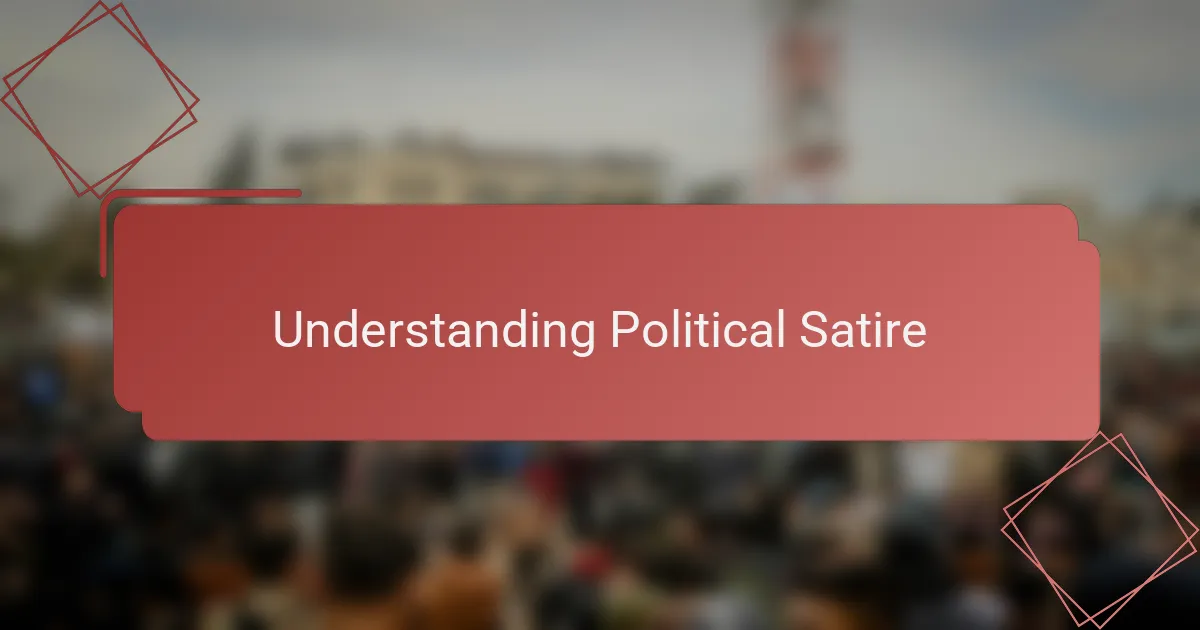
Understanding Political Satire
Understanding political satire starts with recognizing its unique blend of humor and critique. From my experience, satire isn’t just about making people laugh; it’s a clever way to expose the absurdities and contradictions in politics. John Oliver masterfully uses this style to both entertain and inform, often revealing truths that traditional news misses.
What struck me most is how satire can disarm viewers, making heavy political topics feel accessible and engaging. I recall watching one of Oliver’s segments that made a complicated issue suddenly click for me, thanks to his sharp wit and clear commentary. This balance of comedy and analysis is what makes political satire such a powerful tool.
| Traditional Political Commentary | Political Satire (John Oliver Style) |
|---|---|
| Serious tone, focused on facts and analysis | Humorous tone, blending facts with comedic exaggeration |
| Often dense and formal | Accessible and engaging, uses everyday language and pop culture references |
| Appeals mainly to politically engaged audiences | Reaches a broader audience by making politics entertaining |
| Focuses on delivering unbiased information | Uses satire to critique and challenge political figures and systems |
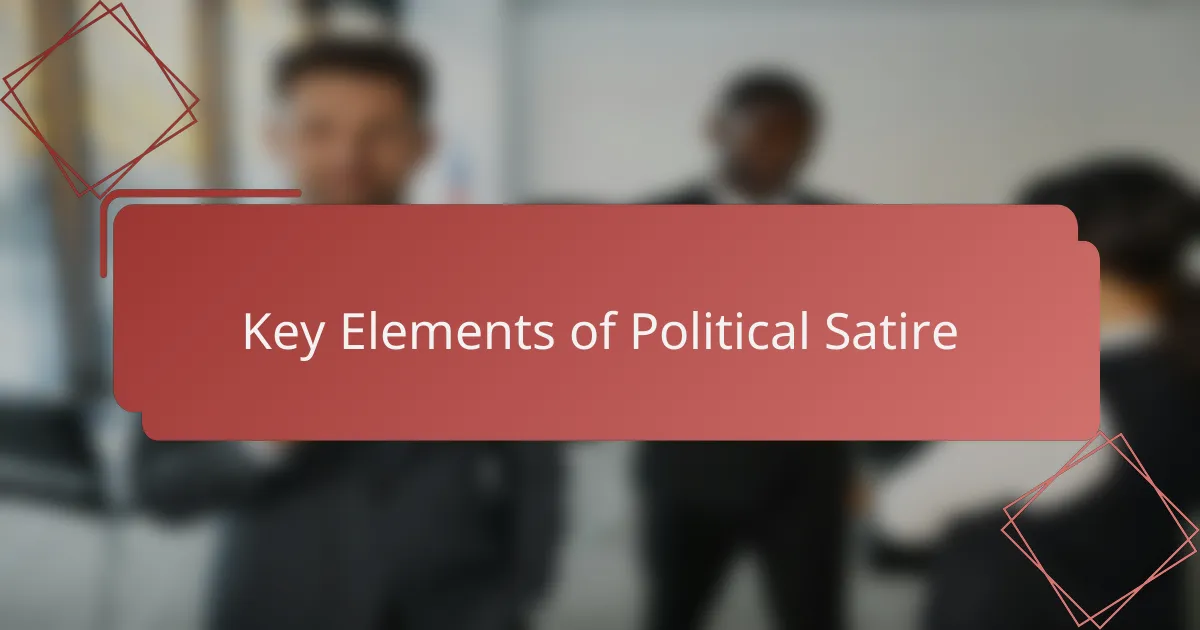
Key Elements of Political Satire
One of the key elements that stands out to me in political satire is its use of irony and exaggeration. These tools highlight the ridiculousness of certain political actions, making them impossible to ignore. Have you ever noticed how a well-timed joke can cut through political jargon and make the truth stick? That’s exactly what satire aims for.
Another aspect I find crucial is the balance between humor and seriousness. John Oliver, for instance, walks this line so skillfully that while you’re laughing, you’re also learning. It’s this blend that keeps you engaged without feeling overwhelmed by the heaviness of the topics.
Lastly, political satire thrives on context and timing. A joke about a slow-moving policy debate might fall flat if the audience isn’t aware of recent developments. From my experience, the best satire connects deeply with current events, making the commentary feel immediate and relevant rather than just distant critique.

Overview of John Oliver’s Style
John Oliver’s style strikes me as both sharp and deeply engaging. He has this knack for mixing humor with fact, making complex political issues accessible without dumbing them down. From my experience watching his segments, his timing and tone often add an extra layer of impact that pure reporting lacks.
| Aspect | John Oliver’s Style |
|---|---|
| Humor | Savvy, often dry and sarcastic, while still respectful of serious topics |
| Depth | In-depth research combined with clear explanations |
| Tone | Conversational yet persuasive, mixing cynicism with genuine concern |
| Presentation | Long-form segments allowing nuanced storytelling |
| Engagement | Interactive and relatable, often using personal anecdotes for emphasis |
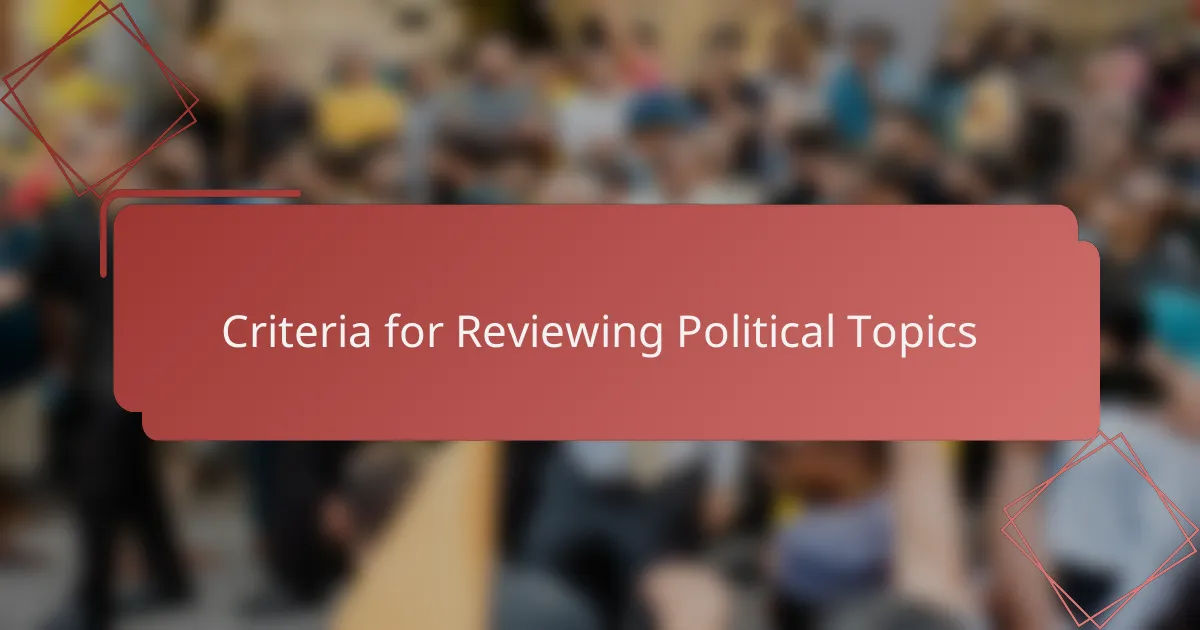
Criteria for Reviewing Political Topics
When I review political topics, I often ask myself: Does this issue have enough relevance and urgency to justify attention? From my experience, the most impactful satire zeroes in on subjects that are not only timely but also resonate emotionally with viewers. Without that connection, even the sharpest jokes can fall flat.
Another important factor I consider is the clarity and fairness of the presentation. Is the satire exposing genuine contradictions and flaws without misleading the audience? I’ve noticed that when satire becomes too biased or muddled, it loses credibility—and that, to me, defeats its purpose.
Finally, I reflect on how well the topic can be unpacked within the constraints of humor. Can complex policies or political scandals be broken down into digestible insights without oversimplifying? John Oliver’s segments show me exactly how to strike that balance, weaving depth and wit that keeps me both informed and entertained.

Analyzing John Oliver’s Political Segments
Diving into John Oliver’s political segments, I’ve found that his analysis stands out because it’s both thorough and accessible. He doesn’t just skim the surface—his deep dive into complex issues invites me to see political topics from angles I hadn’t considered before. How often do you come across satire that respects your intelligence while still making you laugh? That’s exactly the kind of balance Oliver nails every time.
What really strikes me is his ability to use storytelling to frame the political landscape. Instead of dry facts, he builds a narrative that connects with me emotionally, which makes the satire hit harder. I remember one segment where a seemingly boring bureaucratic failure suddenly felt urgent and personal because of how he explained the stakes—he has this way of turning abstract policies into something real and relatable.
Another element I appreciate is his pacing. Oliver’s segments don’t rush; they take time to unpack layered issues while keeping the humor flowing. From my experience, this approach not only holds my attention but also encourages me to think critically without feeling overwhelmed. It’s like having a smart friend guide me through a maze of political chaos with a sharp joke in hand.

Personal Experience Reviewing John Oliver
I found reviewing John Oliver’s political topics both challenging and rewarding. His sharp wit and deep research made me think differently about how satire can influence public opinion. At times, I felt genuinely entertained and informed, which isn’t always easy to find in political commentary.
| Aspect | My Experience |
|---|---|
| Research Depth | Impressive and thorough, which demanded I fact-check extensively. |
| Satirical Style | Engaging and clever, often blending humor with serious issues effectively. |
| Emotional Impact | Made me laugh and reflect, creating a mix of amusement and concern. |
| Presentation | Clear and accessible, despite complexity of subjects. |
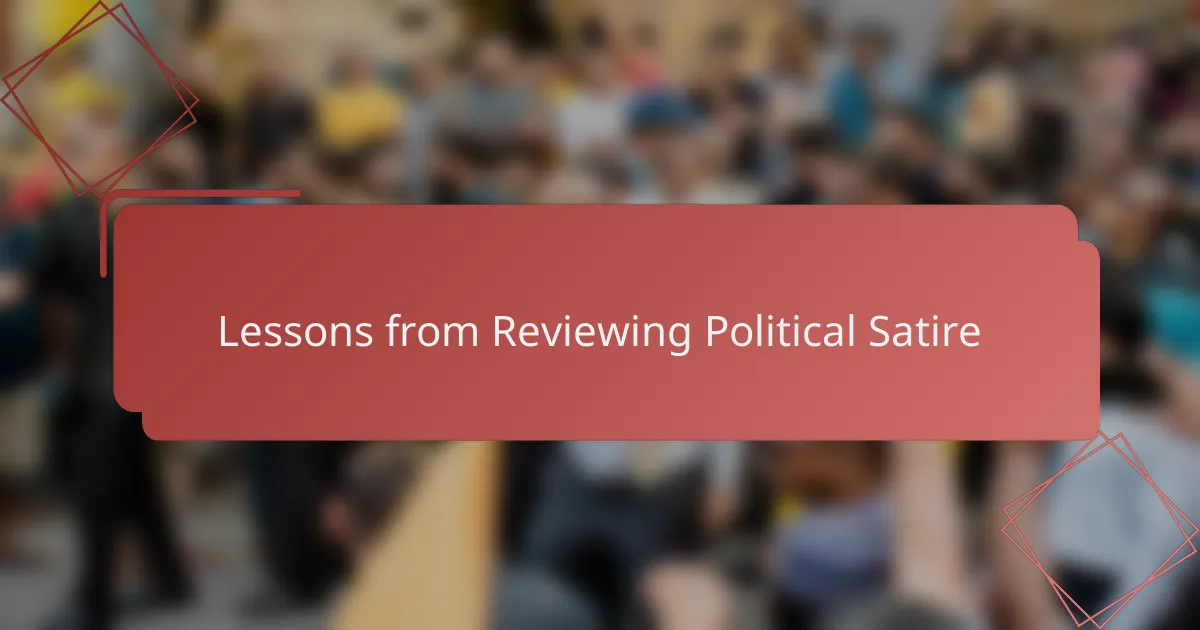
Lessons from Reviewing Political Satire
Lessons from Reviewing Political Satire has shown me how satire like John Oliver’s not only entertains but educates. His ability to blend humor with serious political critique helped me appreciate the power of laughter in unpacking complex issues. I found myself laughing and learning at the same time—a rare but valuable combination.
Reflecting on Oliver’s style, I realized that satire demands sharp observation and courage. It’s not about mocking for the sake of humor but highlighting truths in ways that stick with the audience. This realization has deepened my respect for political satire as both an art form and a tool for civic engagement.
| Aspect | John Oliver’s Approach |
|---|---|
| Humor Style | Sarcastic, witty, and often self-aware |
| Political Insight | Deeply researched with clear fact-based critique |
| Audience Engagement | Uses storytelling and relatable examples to connect |
| Emotional Impact | Combines humor with moments that provoke reflection |


